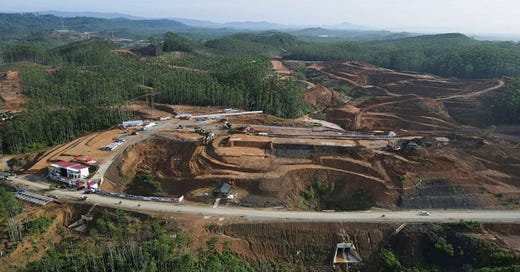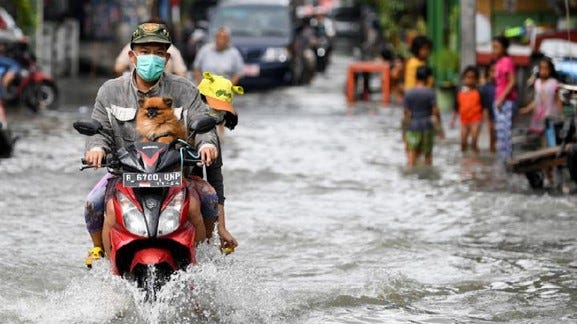Indonesian President’s Capital Dream in Peril
Delays, funding problems, long rumored, become official
The decision on July 9 by Indonesia’s outgoing President Joko Widodo to delay moving his office to Nusantara, his projected national capital 1,300 km across the Java Sea to the jungled island of Borneo this month, as planned, is an ominous sign that his dream to shift nearly 2 million people from Jakarta to ease congestion could short-circuit at a time when Jakarta is growing increasingly ungovernable.
Earlier this week, the state-backed principal contractor PT Wijaya Karya said it had suffered major financial woes, blaming them on the interest burden and losses from the construction and operation of the Jakarta-Bandung high-speed rail (HSR), which operates under the Whoosh brand, which it also built, running into major cost overruns and delays.
“This was predicted,” said a Jakarta-based business source. “Jokowi just commanded them to do stuff. So you got corruption, stupidity, pride etc.”
In a statement to local media, the president, who leaves office in October, said he would only authorize the move to the East Kalimantan state when basic facilities such as electricity and clean water are ready. "Is the water ready or not? Is the electricity ready? Is the place ready or not? If it's ready, move," Jokowi told reporters at Halim Perdanakusuma Air Base in Jakarta. A presidential decree designating the new capital city could be issued before or after October depending on the situation on the ground, he said. But “we don’t want to force something that is not ready. Don’t force it. We need to assess the progress on the ground.”
That leaves Jakarta, a traffic-choked conurbation that in addition to its own metropolitan area includes five satellite cities covering nearly 10,000 sq km with an estimated population of 32.1 million people. The economic, cultural, and political center of the country, it also serves as the diplomatic capital of the Association of Southeastern Nations. It is also now sinking at a truly alarming rate of nearly 28 cm a year in some areas as residents draw down groundwater and pavement sprouts across areas where water could sink into the soil. With climate change raising sea levels and with 13 refuse-choked rivers flowing through it on their way to Jakarta Bay from mountains to the south, it is on borrowed time. Nusantara may be the only answer.
“Jakarta has long been an almost-ungovernable city, beset by traffic, pollution, and overcrowding,” wrote Asia Sentinel in 2022. “But the decision on the name [Nusantara], as well as the site, have now been made and backed by a large majority of legislators…Like other such moves, it will be much resented by civil servants and others forced to make the move. But it is hard to argue against any major effort to better balance population distribution and, in particular, add to the mere 17 million inhabiting 530,000 square kilometers of Indonesian Kalimantan – an area almost the size of France, and develop its economy away from extractive industries, coal oil, and timber.”
Nonetheless, the delay could equally be emblematic of the president’s waning influence as his designated successor, the current defense minister Prabowo Subianto, prepares to take over the reins of power, say analysts and industry sources in the current Indonesian capital. In early June, the head and deputy head of the project resigned abruptly without public comment. The new capital is expected to cost up to Rp466 trillion (US$33 billion) in five phases but is having trouble attracting investors, both domestic and international. Despite Jokowi’s reassurance of international investment, it has yet to secure any foreign investors. So far, despite investment schemes offered by the government, local companies and state-owned institutions have only come up with IDR49.6 trillion (US$3.054 billion). The city’s authority has said that domestic funding can only cover 20 percent of the costs. Public Works and Housing Minister Basuki Hadimuljono, who took over as head of the Nusantara Capital City (IKN) Authority, recently told local media that potential investors are seeking a minimum internal rate of return above 12 percent, based on his experience with handling construction projects under his ministry.
The gigantic project is far behind in its construction schedule. While construction of the facilities housing the presidential offices is underway, there are no basic services including electricity and water. Other construction has been hampered by land use problems, with overlapping status between the right to use owned by the government and land claimed to be owned by local communities that have lived there for decades. As Asia Sentinel reported on June 2, 2,086 hectares of the total 36,000 earmarked are still hampered by land acquisition. At least 16,800 people belonging to 21 groups may be affected, according to data from the Indigenous Peoples Alliance of the Archipelago.
“Why is there no water system or electric grid and yet they are already constructing the office – because that’s what the president wants?” asked a western business source. “The big question is whether Prabowo will do Jokowi's bidding and keep this going. From what we hear, the local business community is just as skeptical as foreign investors. There are a lot of issues – lack of investors, incomplete infrastructure, and the broader question of whether Indonesia needs what is basically a monument to Jokowi.”
The president has made an outsize effort to ensure his continuing influence following his departure from power, planting his children and their partners in positions of power including his son Gibran Rakabuming Raka as Prabowo’s vice presidential running mate, which required a constitutional change of law conveniently supplied by his brother-in-law Anwar Usman, which cost Usman his job as Chief Justice of the Constitutional Court. He has also sought changes in the cabinet to install loyalists who will look after his interests.
But Prabowo is a different matter. A one-time head of Indonesia’s Special Forces before he was fired for human rights abuses, the 72-year-old former general is a mercurial figure who since his February 14 election has given considerable indication he would choose his own course despite protestations of fealty to Jokowi. He has already begun to outline his own foreign policy, visiting foreign capitals well in advance of his October inauguration, for instance.
“Prabowo will keep it breathing but it’s not sure for how long,” said the western businessman. But Prabowo, he said, is far more interested in cementing his legacy through a massive school lunch program expected to cost IDR400-500 trillion through the end of his five-year term. Prabowo made the program, designed to benefit 83 million people, including 20.7 million students and 4.4 million pregnant women, a centerpiece of his presidential campaign.
His economic adviser (and brother-in-law) Soedradjad Djiwandono told the Indonesian-language publication Kontan last week that he prefers the free school lunch program over Nusantara as the former had “clearer” budget planning.
“As an economist, I cannot lie that I prefer the [free] nutritious meal program, because I know it can be implemented immediately,” Soedradjad said. “We have calculated the costs in detail, as well as the eligible [recipients].” Soedradjad added that he isn’t opposed to relocating the nation’s capital from Jakarta, but told Kontan the capital project lacks the careful cost calculations required, especially as regards state budget support, which is reflected in problems related to the clean water supply at the site of the new capital. “Now, do we want to keep borrowing money? Do we want to build a new capital with debt?” Soedradjad said.
The digging is well along in East Kalimantan. The water is rising in Jakarta.






Several mega questions arise every time a Nusantara stories appears. The biggest question is the extent to which corruption will become part and parcel of the making/building of Nusantara, given its scale and the amount of money and time it will take to build this political capital that far away from Indonesia's capitalist hub. Let's be real: the scourge of corruption in Indonesia -- from the regime to the bureaucracy, from the police to the armed forces, from business through "society" -- is endemic and embedded in Indonesia's political, social and economic structures and institutions. None of these are mutually exclusive. And for all his "big talk", Jokowi has failed -- miserably -- to rein in corruption.
Think of Malaysia, where corruption at the official and non-official levels of that country, have been and still reflects a swirling disease. Think of all its megaprojects, all sanctioned by the Malay state from Mahathir to Najib Razak to very possibly Anwar Ibrahim that have enlisted these regimes' politico-business cronies. Anwar Ibrahim might easily claim, as part of his now standard PR stunt, that he's doing something about corruption there. But is he, really? And why would he when it is clear that, as in the past, and so today, corrupt practices, state patronage and populism is what keeps the exclusively Malay regimes in power.
Is it any different in different in Indonesia? The roots of the Suharto era corruption remain embedded. The maniacal greed for wealth accumulation, by hook or crook, is well established since the Asian financial crisis. The downfall of the Suharto and the rise of post-Suharto regimes each has singularly failed to put Indonesian corruption front and center of state policy -- not only under Jokowi but, I'll bet, even under the dark figure of Probowo for all of his "big talk" too.